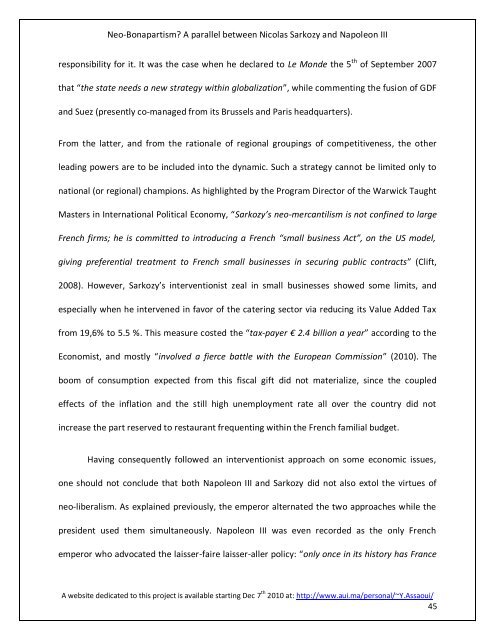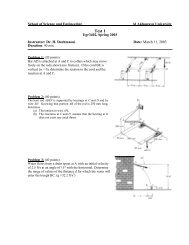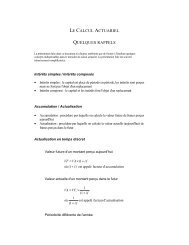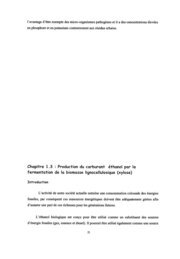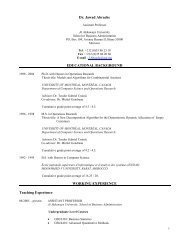Neo-Bonapartism? A parallel between Nicolas Sarkozy and ...
Neo-Bonapartism? A parallel between Nicolas Sarkozy and ...
Neo-Bonapartism? A parallel between Nicolas Sarkozy and ...
Create successful ePaper yourself
Turn your PDF publications into a flip-book with our unique Google optimized e-Paper software.
<strong>Neo</strong>-<strong>Bonapartism</strong>? A <strong>parallel</strong> <strong>between</strong> <strong>Nicolas</strong> <strong>Sarkozy</strong> <strong>and</strong> Napoleon III<br />
responsibility for it. It was the case when he declared to Le Monde the 5 th of September 2007<br />
that “the state needs a new strategy within globalization”, while commenting the fusion of GDF<br />
<strong>and</strong> Suez (presently co-managed from its Brussels <strong>and</strong> Paris headquarters).<br />
From the latter, <strong>and</strong> from the rationale of regional groupings of competitiveness, the other<br />
leading powers are to be included into the dynamic. Such a strategy cannot be limited only to<br />
national (or regional) champions. As highlighted by the Program Director of the Warwick Taught<br />
Masters in International Political Economy, “<strong>Sarkozy</strong>’s neo-mercantilism is not confined to large<br />
French firms; he is committed to introducing a French “small business Act”, on the US model,<br />
giving preferential treatment to French small businesses in securing public contracts” (Clift,<br />
2008). However, <strong>Sarkozy</strong>’s interventionist zeal in small businesses showed some limits, <strong>and</strong><br />
especially when he intervened in favor of the catering sector via reducing its Value Added Tax<br />
from 19,6% to 5.5 %. This measure costed the “tax-payer € 2.4 billion a year” according to the<br />
Economist, <strong>and</strong> mostly “involved a fierce battle with the European Commission” (2010). The<br />
boom of consumption expected from this fiscal gift did not materialize, since the coupled<br />
effects of the inflation <strong>and</strong> the still high unemployment rate all over the country did not<br />
increase the part reserved to restaurant frequenting within the French familial budget.<br />
Having consequently followed an interventionist approach on some economic issues,<br />
one should not conclude that both Napoleon III <strong>and</strong> <strong>Sarkozy</strong> did not also extol the virtues of<br />
neo-liberalism. As explained previously, the emperor alternated the two approaches while the<br />
president used them simultaneously. Napoleon III was even recorded as the only French<br />
emperor who advocated the laisser-faire laisser-aller policy: “only once in its history has France<br />
A website dedicated to this project is available starting Dec 7 th 2010 at: http://www.aui.ma/personal/~Y.Assaoui/<br />
45


